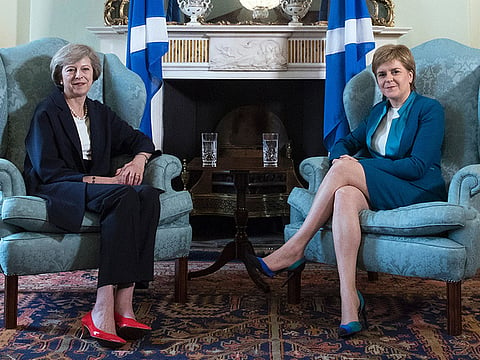May visits Scotland in fight for UK unity over Brexit
Talks will set the tone for their relationship as Britain negotiates its path to the EU exit door

Edinburgh: Theresa May was in Scotland on Friday on her first visit as Britain’s new prime minister, bidding to maintain unity after a Brexit vote that revived Scottish independence ambitions.
May was received in Edinburgh by Scottish First Minister Nicola Sturgeon, who has threatened another referendum on Scotland leaving the UK following Britain’s seismic vote to quit the European Union (EU).
The two leaders posed for photographs outside Sturgeon’s residence before going in for talks that will set the tone for their relationship as Britain negotiates its path to the EU exit door.
May took office on Wednesday after David Cameron stepped down as premier in the wake of the June 23 referendum.
The vote result sent shock waves around the world and sparked fears of an economic downturn, with Britain potentially facing exclusion from Europe’s single market — a key concern for Sturgeon.
In heading swiftly to Edinburgh, May was emphasising her strong support for the union and for keeping Sturgeon’s devolved administration involved in the Brexit negotiations, a Downing Street spokesman said.
“I believe with all my heart in the United Kingdom,” May said in a statement on Friday.
“This visit to Scotland is my first as prime minister and I’m coming here to show my commitment to preserving this special union.”
Voters in Scotland backed Britain staying in the EU and nationalist leader Sturgeon eyes this as possible grounds for another independence referendum.
“Theresa May and I hold very different political views and we’ve got perhaps different views on what should happen now in terms of the Brexit vote,” Sturgeon told STV television on Thursday.
“My position is that I respect how people in other parts of the UK voted; I hope the prime minister will respect how people in Scotland voted.”
While 52 per cent of voters across the UK backed leaving the EU, 62 per cent in Scotland opted for Britain to remain in the bloc.
A day after the Brexit vote, Sturgeon said it was “highly likely” the country would hold a second independence referendum.
Two years ago, Scots voted to remain part of the UK.
After six years as Cameron’s interior minister, May was viewed as a safe pair of hands to replace him, but began with a deep cull of some of her former cabinet colleagues.
She sacked long-serving finance minister George Osborne and Brexit-campaigning justice minister Michael Gove — but stunned world capitals by appointing the often undiplomatic Brexit spearhead Boris Johnson as foreign minister.
Graduates of Eton and other elite private schools who made up half of Cameron’s cabinet were forced to take a back seat in the overhaul.
Over two-thirds of the new cabinet attended state schools, in line with May’s promise on taking office to “build a better Britain ... that works for everyone — not just the privileged few.”
“May’s radical reshuffle stuns the old guard”, said The Guardian newspaper’s front page on Friday.
But controversy over Johnson’s appointment has overshadowed the start of her tenure.
French Foreign Minister Jean-Marc Ayrault accuses the ex-mayor of having “lied a lot” during the referendum campaign.
Attending the French ambassador’s Bastille Day party in London — before news of the terror attack in Nice emerged — Johnson pleaded a deep love of Europe, in a speech that drew a mix of cheers and boos.
European leaders have pressed May to move quickly in implementing Brexit, amid fears of the damage the continued uncertainty could do to the EU and the world economy.
The Bank of England on Thursday held off on an anticipated cut in interest rates, keeping them unchanged at 0.50 per cent, but signalled a possible cut next month.
New finance minister Philip Hammond has promised to work closely with central bank governor Mark Carney “to keep the economy on track.”
Meanwhile, mourners were gathering on Friday for the funeral of murdered opposition Labour MP Jo Cox in her northern English constituency.
Cox, a “Remain” supporter, was shot and stabbed during the charged referendum campaign.
The local man accused of her murder gave his name in court as “Death to traitors, freedom for Britain”.
Her assassination was the first of a British lawmaker in 26 years.
Sign up for the Daily Briefing
Get the latest news and updates straight to your inbox



